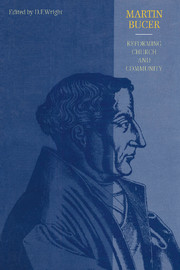Book contents
- Frontmatter
- Contents
- Notes on contributors
- List of abbreviations
- Introduction
- 1 Martin Bucer and the Old Church
- 2 The relation between church and civil community in Bucer's reforming work
- 3 Bucer's influence on Calvin: church and community
- 4 The church in Bucer's commentaries on the Epistle to the Ephesians
- 5 Church, communion and community in Bucer's commentary on the Gospel of John
- 6 Eucharistic communion: impulses and directions in Martin Bucer's thought
- 7 Martin Bucer and the ministry of the church
- 8 Infant baptism and the Christian community in Bucer
- 9 Bucer's ecclesiology in the colloquies with the Catholics, 1540–41
- 10 The Strasbourg Kirchenpfleger and parish discipline: theory and practice
- 11 Ecclesiological motifs behind the creation of the ‘Christlichen Gemeinschaften’
- 12 Martin Bucer in England
- 13 Martin Bucer and the Englishing of the Psalms: pseudonymity in the service of early English Protestant piety
- Bibliography
- Biblical index
- Index of Bucer's works
- Index of modern authors
- General index
8 - Infant baptism and the Christian community in Bucer
Published online by Cambridge University Press: 22 September 2009
- Frontmatter
- Contents
- Notes on contributors
- List of abbreviations
- Introduction
- 1 Martin Bucer and the Old Church
- 2 The relation between church and civil community in Bucer's reforming work
- 3 Bucer's influence on Calvin: church and community
- 4 The church in Bucer's commentaries on the Epistle to the Ephesians
- 5 Church, communion and community in Bucer's commentary on the Gospel of John
- 6 Eucharistic communion: impulses and directions in Martin Bucer's thought
- 7 Martin Bucer and the ministry of the church
- 8 Infant baptism and the Christian community in Bucer
- 9 Bucer's ecclesiology in the colloquies with the Catholics, 1540–41
- 10 The Strasbourg Kirchenpfleger and parish discipline: theory and practice
- 11 Ecclesiological motifs behind the creation of the ‘Christlichen Gemeinschaften’
- 12 Martin Bucer in England
- 13 Martin Bucer and the Englishing of the Psalms: pseudonymity in the service of early English Protestant piety
- Bibliography
- Biblical index
- Index of Bucer's works
- Index of modern authors
- General index
Summary
The practice of baptizing new-born babies, which was perpetuated by all the branches of the magisterial Reformation, was one of the deepest storm-centres of religious conflict in the sixteenth century, not least in Strasbourg. Inherited from the Old Church, it had to be purged, in the judgement of the non-Lutheran Reformers at least, of the Old Church's damaging theological legacy – focused in the Augustinian teaching that infants dying unbaptized were lost – and the more superstitious accretions of popular piety. At the same time, its very continuation without obvious biblical precedent laid the Reformers open to sniping from Catholic opponents who claimed to discern a hypocritical inconsistency with the appeal to ‘Scriptura sola’ (Scripture alone). In the life of the reformed churches there was surely no other observance of remotely comparable importance that was maintained with such an embarrassing lack of explicit biblical justification.
To Radicals of every hue, whose variety and prominence created Strasbourg's religious kaleidoscope in the later 1520s and early 1530s, the retention of baby baptism was much more than a gift horse for controversialists. Bucer knew that people like Bernard Rothmann of Münster viewed paedobaptism as ‘the seed-bed of the church's desolation and dereliction’, responsible for causing ‘the knowledge of God to perish from the earth, with scarcely a trace of the true church now visible in the world’.
- Type
- Chapter
- Information
- Martin BucerReforming Church and Community, pp. 95 - 106Publisher: Cambridge University PressPrint publication year: 1994
- 1
- Cited by



